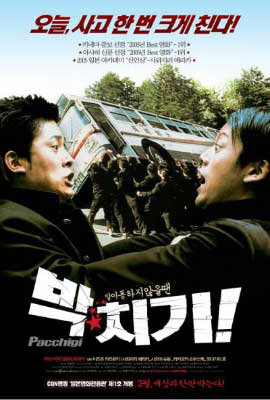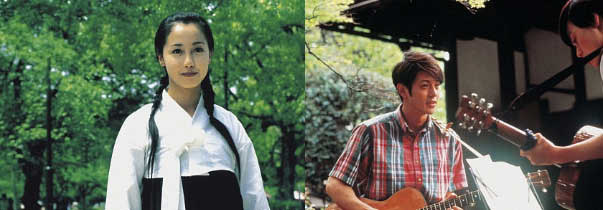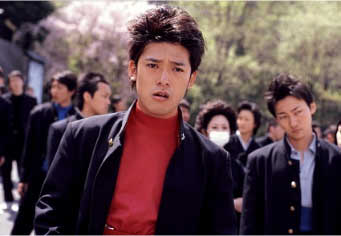We Shall Overcome Someday
(Pacchigi)

Director: Kazuyuki Izutsu
Year: 2004
Running Time: 118 minutes
Production Company: Cine Qua Non
Awarded the top spot in Japan’s prestigious Kinema Junpo critic’s poll,
this film doles out equal amounts of tender romance and bottle breaking brawling
in a Romeo and Juliet tale of clashing cultures in Kyoto in 1968. Currently,
Japan is in the midst of a faddish love affair with Korean pop and is gobbling
up their TV dramas and music idols by the handful, but as this film shows
there has long been a deep enmity between the Japanese and the Koreans who
were brought over to work in Japan and settled there. In one very powerful
scene a Japanese student is angrily asked to leave the funeral of his Korean
friend followed by an embittered tirade of the injustices that have been
levied against the Korean population in Japan.

It is a stunning moment in a film that until then had left much of this unstated
but had simply focused on the intense dislike between two high schools divided
by a river and by ethnicity. History is an even bigger divide it turns out.
Amusing at times, wrenching at others, the film is fueled by winning performances,
a sense of nostalgia and an underlying human element that speaks volumes
to the fact that with all of our differences we are still just people trying
to do the best we can for our family, our friends and ourselves. The Kamo
River cuts from north to south through the city of Kyoto and on one side
lives the Korean locals who do their best to preserve their culture, avoid
the Japanese and dream of going home to Korea someday. In a symbolic
way this river reminds the Koreans of their old homeland which is separated
as well and they sing longingly of it in the song “The Imjin River”.

The two cultures bang heads one afternoon when a couple of insolent Japanese
high school students wander into the Korean part of town on a school outing
and mess with a few neighborhood girls. This brings down the wrath of the
nearby Korean high school and the Japanese students are taught a lesson when
they are beaten and then for good measure their school bus is tipped over.
Caught in this melee is the innocent Kosuke (Shun Shioya), who has just styled
his hair into a bowl look to impress the girls (not a chance) and wants to
learn to play guitar. As the bus begins to topple over he gets a quick glimpse
of the adorable Kyung-ja (Erika Sawajiri – “Shinobi”) and is instantly infatuated.

When Kosuke’s teacher hears of the altercation, he insists that the two groups
try and bond over a game of soccer (“only war can defeat war”) and he sends
Kosuke and his equally timid friend Yoshio (Keisuke Koide) to the Korean
school to deliver the invitation. In a state of near paralysis the two go
into the school and meet instant hostility and threats and go scooting off
through the hallways – until Kosuke hears a lilting flute playing a song
and he peers into the classroom only to see the same girl he saw on the previously
day. In an effort to win her heart he learns the song on his guitar and some
Korean to woo her. They begin to shyly date, but the fighting between the
Koreans and Japanese escalates with Kyung-ja’s tough brother Ang Son (Sosuke
Takaoka) leading the Korean forces. There seems little chance for the couple
to seal their love among such bitterness until Kosuke plays the song he learned
– The Imjin River - on the radio and in a finale that sent shivers down my
spine the melancholy song wafts over the city at night as two large forces
break into a fight on the river bank, a friend is put to rest, a baby is
born into the world and a young woman runs to the man she loves.
Other Japanese films that have addressed the issues of Japanese-Koreans
are “Blood and Bones” and “Go”.
My rating for this film: 7.5
Erika Sawajiri with a slightly different
look!






